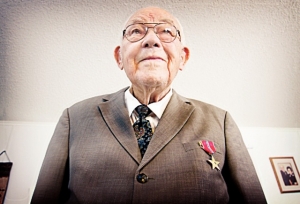Thanks to hurricane, veteran finally gets his Bronze Star
By Kenneth Fine
Published in News on June 5, 2011 1:50 AM

News-Argus/MICHAEL BETTS
The Rev. Walter Satterfield has finally received his Bronze Star, decades after earning it during his service in the Army during World War 11 -- thanks to Hurricane Floyd forcing him to replace the decorations he had.
It started with a simple act of kindness -- a pair of men dedicating themselves to reclaiming, for one of their heroes, pieces of his life story taken by Hurricane Floyd.
But when Larry Mozingo and Glenn Fields reached the end of a journey they embarked on just before Veterans Day 2010, they discovered something about a local World War II veteran that, for more than 60 years, was unknown even to him.
Walter Satterfield had no idea his experiences in Germany and France had earned him the honor of the Bronze Star Medal.
And had it not been for a storm that filled his house, "up to the windows," with water more than 10 years ago, he likely never would have.
But the truth is, that would have been OK with this particular Army veteran.
"If I deserve it, OK, I guess," Satterfield said, choking up. "But it don't make me greater than anyone else. I'm no hero. I'm just an American."
*
Satterfield had mixed emotions about being drafted.
He had just gotten married.
He was only 19.
"But somebody had to go," he said. "So I went."
And he would be assigned to the Army's 63rd Infantry Division, a unit that was charged, shortly after landing at Marseille, France, with keeping enemy forces at bay.
"If the Germans broke through, we had to push them back," Satterfield said. "And we had some great men -- believe me."
But not all of them, the soldier explained, made it home.
He recalls a particular assignment -- one in which he was told to "count the dead" -- and his eyes fill with tears.
"I think there were 21 the first time. I had to put the tag and the bag ... so they would know who was who," Satterfield said. "A man tells you he wasn't afraid, he's the biggest liar that ever walked. I was afraid the whole time."
And there were moments when his own death seemed imminent.
"It was dark as pitch when we crossed the Rhine," he said. "The sergeant said, 'Put your bayonets on.' That's a funny feeling in the dark night. Let's just say, I'm not supposed to be here. The Lord must have been with me all the way."
The man has other memories -- the night he took cover from a German tank firing on his position; the day he came across a concentration camp.
"That's something else that hangs on me," Satterfield said. "But even that wasn't the worst of it."
Those memories, though, are ones he keeps to himself.
"I won't talk about it," Satterfield said. "I can't."
And even after all these years, he refuses to define himself in the terms historians use to characterize those who served during World War II.
"I'll say it again. I'm no hero," he said, as tears, again, formed in his eyes. "We left all of them over there. That's just the way it is."
*
Satterfield never knew that the Combat Infantryman Badge he earned in Europe entitled him to a Bronze Star Medal.
"That badge meant that you were there -- that you had seen combat," Fields said. "So any man who had that patch, they authorized them to be eligible for the Bronze Star."
But even when, from his wheelchair, Satterfield looked down at the decoration now hanging in a box inside his home, his thoughts were on those who rated the honor before falling on the battlefield.
They, too, the former soldier said, must receive their due -- even if it takes men like Fields and Mozingo to bring it to light.
"It should happen and I believe it will happen," Satterfield said. "Yeah, there's coming a reckoning day."
